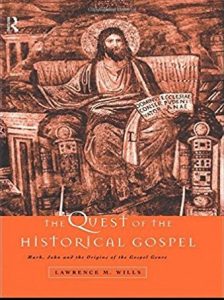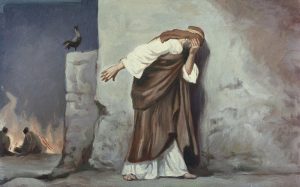Short answer, the one I would give if I had to bet my house on being right: I don’t know.
Short answer, but one I would offer at no risk of damages to myself if I am wrong: Probably.
 In two recent posts I was commenting on thoughts arising as I was reading about the Life of Aesop in Tomas Hägg’s The Art of Biography in Antiquity (2012). I first learned about the Life of Aesop in another work, one exploring the origins of gospel genre, The quest of the historical gospel: Mark, John, and the origins of the gospel genre by Lawrence M. Wills (1997): Wills does not suggest that the Gospels of Mark and John (the two canonical gospels most similar to Life) borrowed from or were influenced by the Life of Aesop, but that the gospel genre was derived from a type of narrative about hero-cults of which Life and the gospels are examples. Both kinds of literature told the tale of a hero founder of a cult who
In two recent posts I was commenting on thoughts arising as I was reading about the Life of Aesop in Tomas Hägg’s The Art of Biography in Antiquity (2012). I first learned about the Life of Aesop in another work, one exploring the origins of gospel genre, The quest of the historical gospel: Mark, John, and the origins of the gospel genre by Lawrence M. Wills (1997): Wills does not suggest that the Gospels of Mark and John (the two canonical gospels most similar to Life) borrowed from or were influenced by the Life of Aesop, but that the gospel genre was derived from a type of narrative about hero-cults of which Life and the gospels are examples. Both kinds of literature told the tale of a hero founder of a cult who
- is introduced to the narrative as an adult (no birth or childhood details)
- undergoes a dramatic change in personal identity or abilities and role (baptism and the Holy Spirit; being miraculously given the gift of speech)
- tells a long tale of short episodes in which the hero challenges those about him and “turns the world upside down” with his superior wisdom and parables or fables
- is often described through the literary technique of inclusio or sandwiching one story between two parts of another
- travels to the site of a major national temple (Jerusalem, Delphi)
- offends hearers by his “truth telling”
- utters parables or fables to convey lessons for his audiences, some of them condemning his hearers
- is condemned for blasphemy and arrogant claims
- was such a help to others with his wisdom but cannot save himself
- is condemned to execution, and so dies
After the deaths of both Jesus and Aesop many people are remorseful and a cult was established in honour of the wronged hero. Both Life and the gospels are believed to have been written around the same time — the first century CE or possibly second century CE.
It is little wonder, then, that Wills begins his discussion with
The most important novelistic biography for the comparison with the gospel genre is the anonymous Life of Aesop. (Wills, 1997. p. 23)
If we are doing comparisons one question that will interest many of us will be just how historical the respective narratives are. I won’t attempt to discuss that question in relation to the gospels and Jesus in this post for obvious reasons, so let’s look at Aesop. Wills is looking at origins of gospel genre but Tomas Hägg gives us a more comprehensive survey of Life as an ancient biography so from this point on I rely upon Hägg. Continue reading “Did Aesop Exist?”

